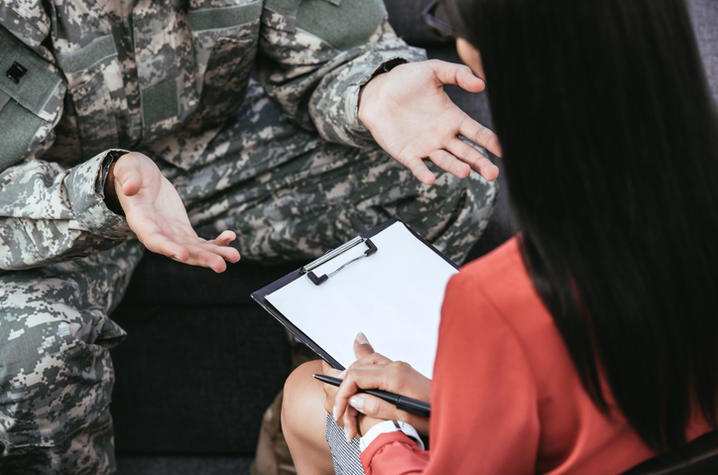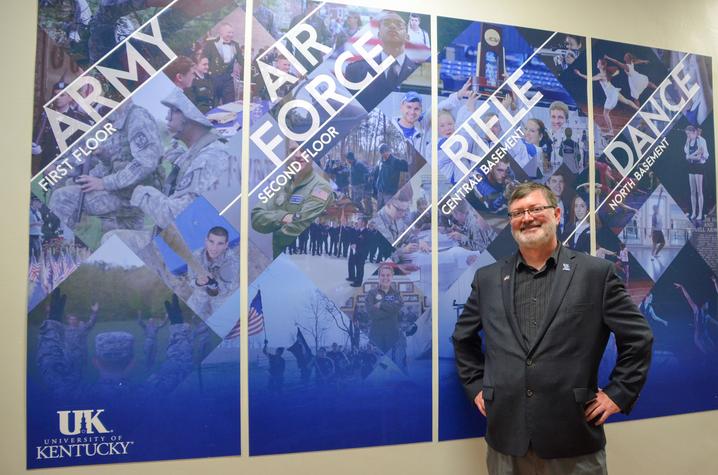New Lab Addresses Mental Health, Wellness Among Military Population
LEXINGTON, Ky. (Oct. 7, 2019) — Every day, men and women across the nation choose to serve — together, they vow to protect our freedom at any cost. This selfless act is not lost upon Chris Flaherty, who serves as director of the new Military Behavioral Health Lab in the UK College of Social Work (CoSW).
"This morning I awoke a free person in a free country," he said. "Someone gave their life to make this possible. I try to remind myself of this often."
Flaherty, who is also an associate professor, is acutely aware of the unique challenges service members and military families face. He was fresh out of high school when he joined the U.S. Air Force in 1985.
"When I enlisted, I was given a large binder with dozens of job descriptions and told to choose my top preferences. I saw a description for mental health technician and chose it."
A job that started by happenstance would turn into a 20-year career.
Upon enlisting, Flaherty trained to become a mental health technician at Fort Sam Houston, Texas. For seven years, he worked hand-in-hand with psychologists and psychiatrists to provide behavioral health care services to military members and their loved ones.
That's when he learned the military population often puts service before self — which can be both a strength and a weakness.
"Stigma surrounding behavioral health treatment is a big barrier, both in civilian and military populations," Flaherty explained. "Service members are especially reluctant to seek treatment due to concerns about the impact upon career progression, and also because of cultural factors inherent in the military, such as stoicism, self-reliance, duty to others and self-sacrifice."
In 1992, Flaherty completed graduate studies in social work and was commissioned as a clinical social work officer — a title he would hold until retiring in 2005. That same year, he joined the faculty in the CoSW.
"As a social work officer, I had the opportunity to work with these patriots and to appreciate the sacrifices they make every day," Flaherty said. "The Department of Defense (DoD) and Veterans Affairs (VA) offer a robust array of behavioral health services, but civilian institutions — such as UK — are invaluable partners in developing best practices to serve this population."
In recent years, the CoSW has undertaken numerous military behavioral health (MBH) initiatives. In October 2016, they established a partnership with the DoD to offer a one-of-a-kind master's degree. A satellite site was created within the Army Medical Department Center and School at Fort Sam Houston. Today, 70% of incoming Army social work officers hold a UK diploma.
The Military Behavioral Health Lab, which officially launched on Oct. 1, will build upon that considerable momentum. By generating empirical knowledge and testing clinical interventions, the lab aims to address mental health and wellness issues that affect active-duty, reserve, and veteran military populations and their families.
“MBH is a testament to our college’s commitment to serving those who serve our country," Jay Miller, the dean of the CoSW, said. “As evidenced by the work currently underway, the College of Social Work has the requisite knowledge, expertise and commitment to positively impact the mental health and wellness of service-connected individuals and their dependents.”
Current projects include employing Heart Rate Variability Biofeedback to treat post-traumatic stress disorder (PTSD) in veterans. The study examines the impact of techniques such as concentration on breath, mindful awareness of physical experience and self-compassion on PTSD symptoms.
Ultimately, the lab will be a vehicle to maximize efficiency, coordination and planning. "Faculty can tend to work in 'silos' — each focused on a specific area of research. Many times, opportunities for collaboration are missed," Flaherty added. "With so many MBH initiatives underway, the college needed a structure to promote collaboration and synergy and to develop strategies to expand educational and research ventures in this area."
Additionally, CoSW students will have the opportunity to partner with faculty members to examine an array of behavioral health topics.
The VA is the world’s largest employer of social workers, with more than 13,000 positions nationwide. The lab will educate students about career opportunities within the DoD and VA, while training them to be the best candidates for those jobs.
“MBH is an example of the university’s commitment to providing high quality services and conducting rigorous research related to a wide array of populations," Miller said. “We look forward to continuing to contribute to improving the lives of military personnel, veterans and their families the world over.”
To learn more about the Military Behavioral Health Lab, you can contact Kaitlyn Brooks or Lindsey Piercy.






